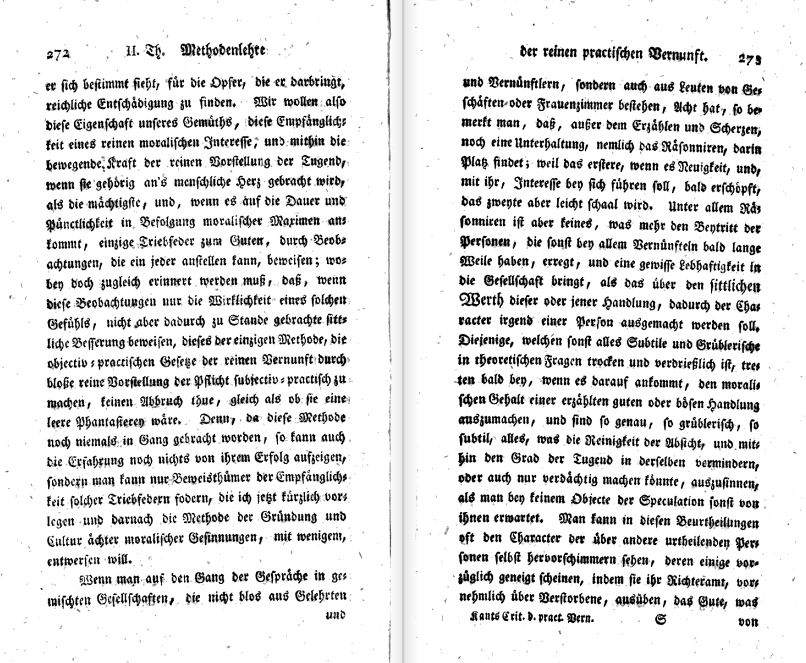Translating Kant Exclusively?
Dr Hine writes:
Cassirer’s rejection of inclusive language earns a passing mention in Weitzman’s introduction to God’s New Covenant—even if only to add that it was considered rather than accidental. Correspondence in the archive shows that this low-key defence was necessitated by the publishers’ reviewers, who debated the extent to which exclusive use of “men” and “brothers” had become unjustifiable by the time of publication (1989).
This afternoon, I found myself wondering about inclusive language in translation of other texts. Throughout Kant’s Critique of Practical Reason, in Cassirer’s translation, the thinking subject is termed “he” and reference is made to “man” and/or “men”. This is probably to be anticipated given the attitude to inclusive language manifest in his New Testament; his translation of CPrR postdates that work by a mere year or two. There’s therefore no particular reason to expect a change of strategy here.
What I found interesting to think on though, is the impact for the reader. As a woman reading, I find myself alienated by Kant, and I think this would obtain to fair extent in the original German also. I.e. How Cassirer translates is to an extent “authentic” in terms of the transmission of Kant’s relation to his audience. This comes out most clearly in a section near the end of CPrR, given at length below.
Kant is turning to everyday life to show the potential for an effective application of practical reason in pursuit of morality. And he describes something akin to the atmosphere of a dinner party (or at least that’s how I imagined it), writing of “conversations in mixed company” (Gesprӓche in gemischten Gesellschaften), which he then qualifies as including “not only scholars and subtle debaters (Gelehrten und Vernünftlern)” i.e. those whom Kant most commonly engages in intercourse (at least in his writings) “but over and above this, men of business, as well as persons of the female sex”.
I quote, of course, the Cassirer translation. Compare for those last words, the Cambridge edition (Mary J. Gregor, 1997): “also of business people or women”. Now here “people” matches more closely Kant’s “Leuten”, though I’m inclined slightly towards tradespeople (with its implication of manual craft) for Kant’s “von Geschäft”. Given that businesspeople in the present era very much includes women, but that Kant is quite definitely treating women as a distinct group, I find that the effect of Gregor’s version is disruptive and misleading.
Likely because what Kant is offering here is a figure, the translation that is representative of the German word (Leuten/people) is too inclusive. Which is a funny thing to write, since I’d hardly expect to find myself on the side of exclusive language. The lesson here is that to follow Kant, we may need to sit with his late eighteenth-century examples in his own terms.
(It’s also interesting to consider that he pulls on the example of Anne Boleyn and Henry VIII, which feels so natural a case for a modern English reader that one might wonder if it were a cultural adaptation. And then wonder what other couple—villain and innocent—one might substitute had those two gone out of fashion.)
Critique of practical reason: excerpt
Towards the end of the Critique of Practical Reason, Kant offers what he terms a “Methodology” (Methodenlehre). In the course of a few pages, he seeks to indicate how people can be encouraged to choose morality, drawing upon observations from daily life. He supplies the following example as part of his argument:
In attending to the course taken by conversations in mixed company comprising not only scholars and subtle debaters, but over and above this, men of business, as well as persons of the female sex, one becomes aware that, apart from story-telling and jesting, still another form of entertainment makes its appearance, namely, people giving way to arguing about things. This happens the way it does because story-telling, provided there is to be any novelty or interest about it, soon exhausts itself, while jesting, for its part, becomes easily insipid. Now among all the various kinds of arguing, there is none which evokes such participation (on the part of people otherwise soon affected by boredom, whenever they find themselves confronted with any reasoning of the sophisticated sort) as when the moral worth of this or that action is talked about—a certain kind of liveliness thus being imparted to the company—and all done with the purpose of making out what is the character to be assigned to some person or other. Those who, as regards theoretical questions, look upon everything which savours of subtlety, everything having its source in rumination, as being arid and a matter of vexation, soon join in when what is at issue is to make out the moral value of a good or an evil action of which they are told, and they are just as precise, just as much given to rumination, just as subtle in finding devices for tracking down anything which could lessen, or throw suspicion upon, the purity of the intention (i.e. the degree of virtue encounterable in the action); though this way of proceeding is not to be expected of them when it is any other object of speculation that is under consideration. [Kant continues:] As regards this way of judging things, it frequently happens that it serves to illuminate the character assignable to the people pronouncing judgment upon others, certain persons appearing to be particularly inclined that, in performing their judicial office (principally in respect of those who have departed this life), they ought to defend the good of which they are told, concerning this or that action, against every mortifying imputation of insincerity, and that they ought ultimately to defend the entire worth of the personality against the reproach of dissimulation or hidden malice. Others again, are intent upon bringing forward accusations and imputations with a view to contesting that worth. Still, as regards this latter type, we cannot ascribe to them, in every case, the intention that, whenever they are faced with particular examples of what men do, they mean to argue in such a way as to discard virtue altogether, so as to declare it to be nothing but an empty name. Instead of this, there is frequent evidence that what is in operation here is nothing other than a well-intentioned strictness, resorted to for the purpose of determining genuine moral worth, the reference being to a law which is inflexible in character. And it is when a comparison is made with a law such as this—not with particular examples—that self-conceit, in matters of morality, finds itself considerably diminished, humility being truly felt by everybody—not merely taught—in the face of such severe self-examination. None the less, what becomes plainly visible in the champions of purity of intention (concerning examples which are being brought forward) is that, where there is a presumption of honest dealing, they would gladly remove even the least blemish, this line being taken, for fear that, if all examples had their veracity impugned, and all human virtue should be taken to have the nature of a mere phantom of the brain, and all striving after it rendered to be of no worth, having the character of an idle affectation and of a self-conceit tending only to deceive. (Kant, tr. Cassirer, pp. 190-1)
Wenn man auf den Sang der Gesprӓche in gemischten Gesellschaften, die nicht blos aus Gelehrten und Vernünftlern, sondern auch das Leuten von Geschӓften oder Frauenzimmer bestehen, Acht hat, so bemerkt man, dass, ausser dem Erzӓhlen und Scherzen, noch eine Unterhaltung, nemlich das Rӓsonniren, darin Platz findet; weil das erstere, wenn es Neuigkeit, und mit ihr, Interesse bey sich führen soll, bald erschӧpft, das zweyte aber leicht schaal wird. Unter allem Rӓsonniren ist aber keines, was mehr den Beytritt der Personen, die sonst bey allem Vernünfteln bald lange Weile haben, erregt, und eine gewisse Lebhaftigkeit in die Gesellschaft bringt, als das über den sittlichen Werth dieser oder iener handlung, dadurch der Character irgend einer Person ausgemacht werden soll. Dieienige, welchen sonst alles Subtile und Grüblerische in theoretischen Fragen trocken und verdriesslich ist, treten bald bey, wenn es darauf ankommt, den moralischen Gehalf einer erzӓhlten guten oder bӧsen handlung auszumachen, und sind so genau, so grüblerisch, so subtil, alles, was die Reinigkeit der Absicht, und mithin den Grad der Tugend in derselben vermindern, oder auch nur verdӓchtig machen kӧnnte, auszusinnen also man bey keinem Objecte der Speculation sonst von ihnen erwartet. ...

German extract transcribed from the Google Books facsimile of Critik der practischen Vernunft von Immanuel Kant. Zweyte Auflage. Riga: Johann Friedrich Hartknoch 1792. Pp. 272–3 (shown).
I.e. the second edition of Kant's Critique of Practical Reason.
